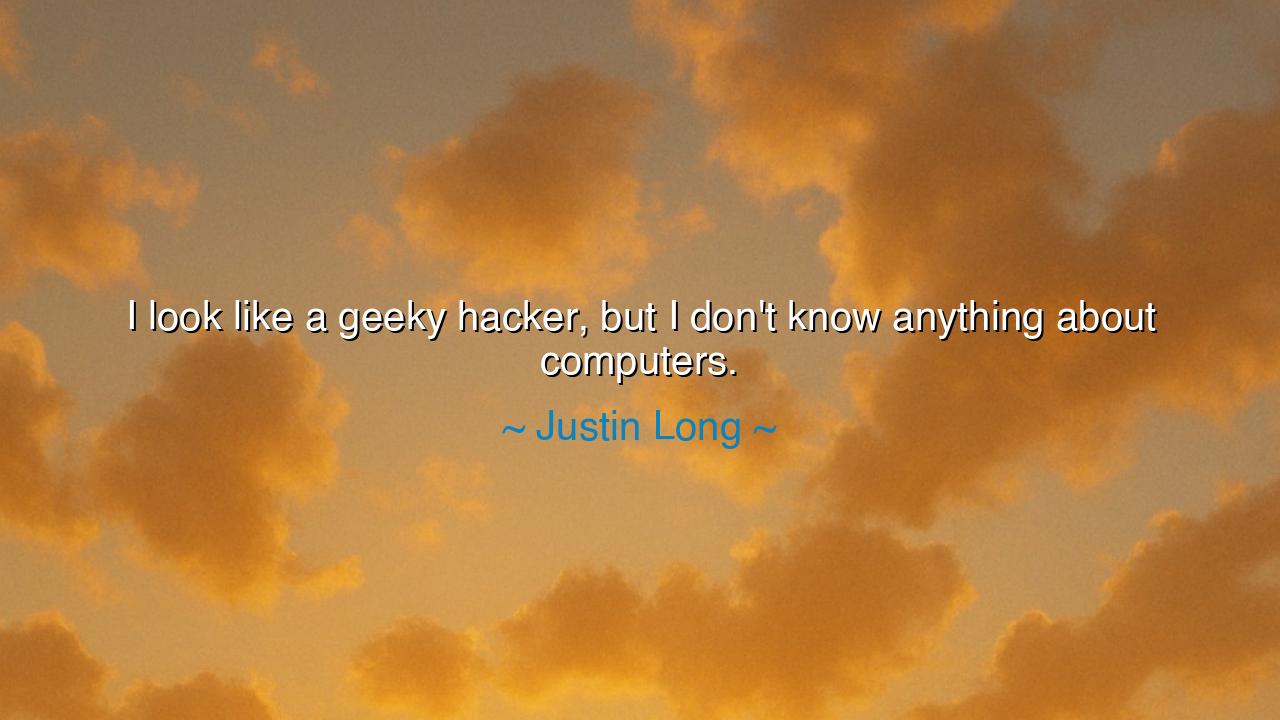
I look like a geeky hacker, but I don't know anything about






In the unfolding narrative of human progress, there are many moments when individuals are judged by their appearance, their actions, or the roles they are asked to play. The words of Justin Long, "I look like a geeky hacker, but I don't know anything about computers," reveal a profound truth about the disconnect between outward perception and the true essence of an individual. In a world that often defines people by the roles they seem to embody, Long’s words serve as a reminder of the complex, multi-faceted nature of identity, and the way in which external impressions can mislead us.
The Greeks, in their wisdom, understood the tension between appearance and reality. Socrates was often portrayed as a figure whose appearance did not match the greatness of his intellect. His simple dress, unkempt hair, and unassuming nature stood in stark contrast to his profound wisdom. In fact, many in Athens dismissed him at first, merely because he did not conform to the standard of an educated philosopher—an image of elegance, polish, and wealth. Socrates taught us that true wisdom lies not in external perceptions, but in the depth of thought and the purity of intention. Similarly, Long's quote underscores that appearances can be deceiving, and that knowledge is not always reflected in the way one presents themselves to the world.
Consider the Romans, who also understood the power of perception in shaping the legacy of individuals. Julius Caesar, though a brilliant military strategist and leader, often had to fight against the perception that he was merely a man of power, not a man of ideas. To Caesar, image was crucial, and he knew that the public’s perception of him could either solidify or undermine his political strength. However, he also understood that true power comes from one’s actions and ideas, not from the robes or the pomp of his status. Caesar's ability to transcend his initial image and make a lasting impact was not due to his outward appearance, but to the substance of his decisions and vision for the empire.
In a similar vein, Long’s reflection highlights how misconceptions can surround individuals based on their external characteristics, yet the true essence of their abilities lies beneath the surface. The story of Leonardo da Vinci, the Renaissance man, exemplifies this truth. While Leonardo is often remembered for his artistic genius, he was also a gifted inventor, anatomist, and engineer. Yet, his multifaceted genius was not immediately apparent in his portrait or his social standing. His work—which spanned both the arts and the sciences—challenged the rigid boxes that people tried to place him in. Leonardo’s legacy, like Long’s, shows us that appearances are merely surface reflections, and often do not capture the full scope of one’s potential.
Yet, the wisdom in Long’s words is not merely about appearance but also about self-awareness and honesty. To admit that one does not know something, even while being cast into a certain role or identity, is a moment of humility. The ancients revered humility as a core virtue, for it was only through recognizing one’s limitations that true growth could occur. Socrates famously said, "The only true wisdom is in knowing you know nothing." By admitting that he was not a computer expert, Long mirrors the ancient wisdom of self-reflection and the rejection of false pride.
The lesson from Long’s statement is one of integrity—the courage to embrace your true self, despite what society may expect or assume about you. In today’s world, where social media and digital identities often place us in neat categories, Long’s honesty is a reminder that the labels others put on us do not define our true capabilities or worth. Just as Socrates questioned his assumptions and those of others, we too must be willing to challenge the narratives that limit us, acknowledging our gaps and finding authenticity in our pursuit of growth.
So, in our own lives, let us remember that while others may judge us by the roles we seem to play, it is the depth of our character and our actions that reveal our true worth. Let us not be confined by the external labels we inherit or the misconceptions others may have about us. Instead, let us take inspiration from Long's words and live with humility, knowing that we are more than the roles we are cast into. Just as Leonardo da Vinci transcended the limitations of his time, so too can we break free from the constraints of external perception and embrace the fullness of our potential.






AAdministratorAdministrator
Welcome, honored guests. Please leave a comment, we will respond soon